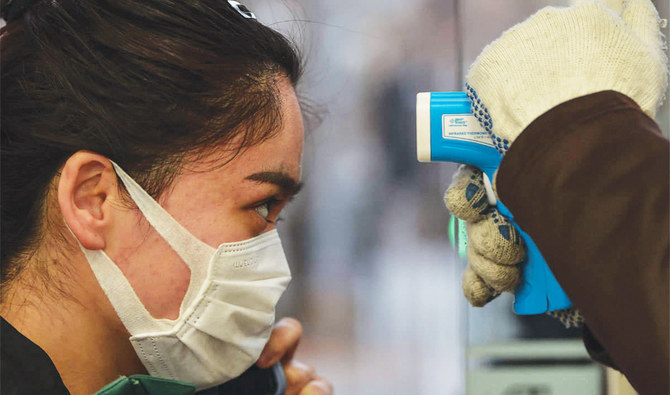LONDON: The UK is overseeing the world’s largest coordinated drugs trial in a bid to find viable treatments for COVID-19. More than 5,000 patients across 165 National Health Service (NHS) hospitals — around 10 percent of all COVID-19 hospital patients in the UK — have volunteered in the past month for tests as part of the trial titled “Recovery.”
It hopes to make progress within weeks, ahead of other trials in the US and Europe, which remain in their formative stages with just a few hundred volunteers.
“Recovery” is being led by experts who previously worked on Ebola drug trials in West Africa.
Peter Horby, professor of emerging infectious diseases and global health at Oxford University, told The Guardian that the trial was unlikely to yield a “magic bullet.”
He said: “This is by far the largest trial in the world. We’re guessing some time in June we may get the results. If it is really clear that there are benefits, an answer will be available quicker.”
The trial will feature an array of treatments, including hydroxychloroquine, a drug touted as a potential cure by US President Donald Trump, and the antibiotic azithromycin.
A combination of the two has been promoted by French doctor Didier Raoult and tentatively praised by President Emmanuel Macron.
“Recovery,” though, will wait to see individual outcomes of both hydroxychloroquine and azithromycin before attempting to use the pair in conjunction.
Horby suggested that any claims the former was an effective treatment were not based on sound evidence.
“There is in-vitro evidence that it (hydroxychloroquine) is inhibitory against the virus (in a laboratory setting),” he said. “But I haven’t seen any sound clinical data.”
Other treatments set to be trialled include antiviral drugs lopinavir and ritonavir, and anti-inflammatory drug dexamethasone, used by HIV patients; the immunomodulator tocilizumab, which is used to treat rheumatoid arthritis; and convalescent plasma taken from the blood of recovered coronavirus patients.
The antiviral drug remdesivir, which was initially earmarked for use in the “Recovery” trial, will not be used as it is currently being heavily prescribed for COVID-19 patients in both China and the US.
New and experimental treatments, meanwhile, are set to be added to “Recovery” as soon as they become available.
FASTFACT
It hopes to make progress within weeks, ahead of other trials in the US and Europe, which remain in their formative stages with just a few hundred volunteers.
The trial’s co-leader Martin Landray, professor of medicine and epidemiology at the Nuffield Department of Population Health, said the speed and scale of its assembly were remarkable.
“It tells you what can happen when everybody is incentivized to make stuff happen as opposed to dither, delay,” he said.
Horby, though, was quick to lower expectations that “Recovery” would discover a cure for COVID-19 in a comparable space of time.
“I think we have to temper people’s expectations about these drugs. It’s possible some might have an effect, but it’s likely to be modest,” he said.
“I think what we’ll be looking at in terms of making a significant impact will be moving on to combinations once we know of things that work. If we combine antiviral and anti-inflammatory drugs, they might have a bigger impact,” he added.
“If you are saying this is an acute, serious viral infection, that’s really difficult to treat, you can counter that with … well, look at Ebola. That’s much nastier,” Horby said.
“Very surprisingly, the monoclonal antibodies that were trialled did work. Those are the ones we will be waiting for with a bit of bated breath to put into the trial when they become available.”


























